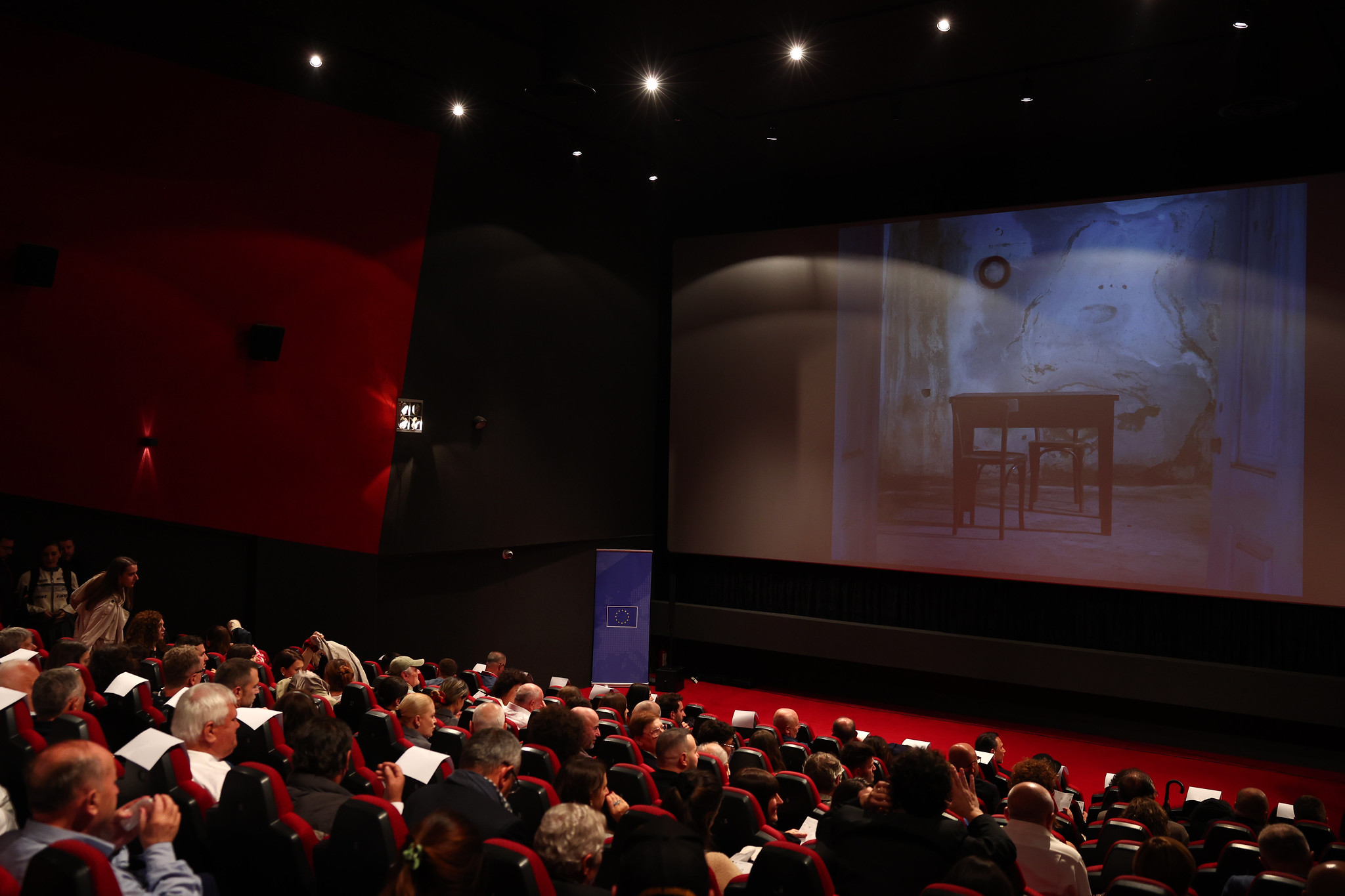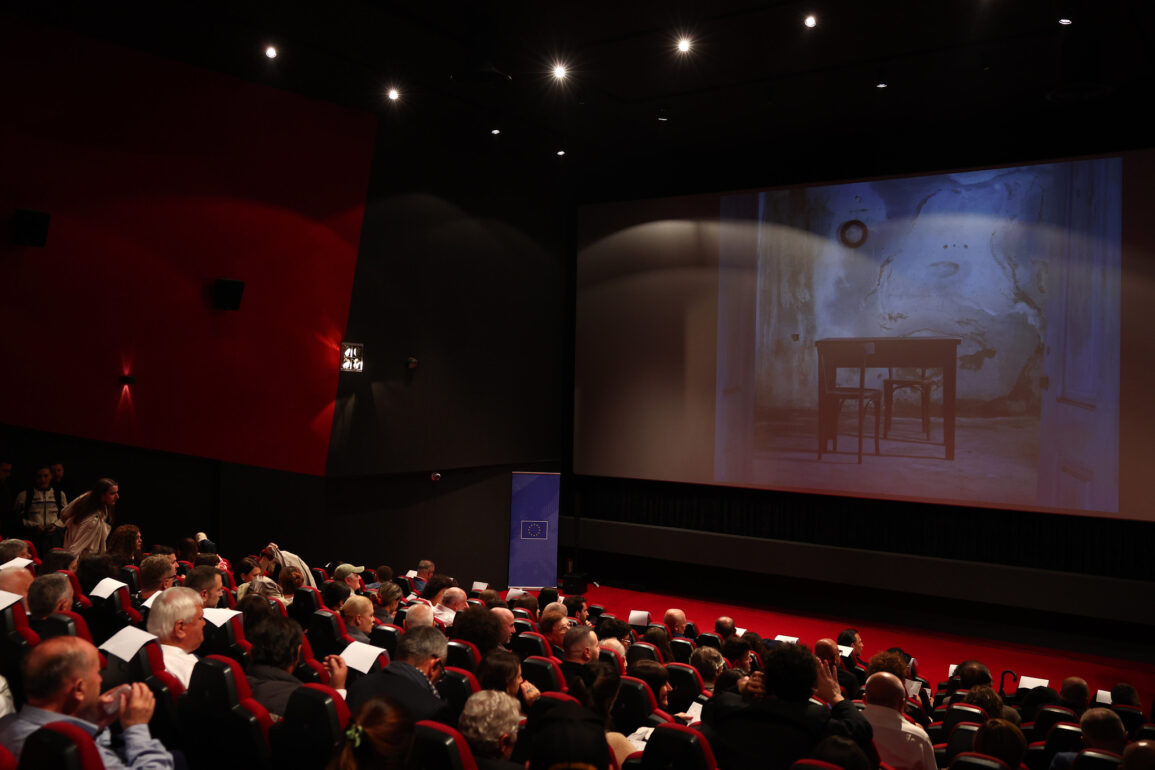
The “Waltz of Happiness” echoes through one of the cells of the former Spaç prison as actress Rosella Pelicioti joins the dance, using a wooden chair as her partner. Her body entwines with the wooden object in painful duet, where the partner is more of a loop that tightens a thin body-which carries the weight of fear and anxiety in every touch and every move.
An empty table is behind them, witnessing the absurd in which people lived and survived in Spaç prison under communist regime in Albania, where happiness and waltz were impossible. As owning and belonging was relative at that time, the actress leaves the chair at the scene’s end.
The sequence is part “303”, a video-film by choreographer Gentian Doda. Using a narrative which comes through the image, it aims to create and show the weight of pain, waiting, longing and violence that accompanied ex-politically prisoners’ lives in the prison camp, located in the middle of the mountains in Mirdita. The film opens with a woman who has to walk almost 7 kilometres to reach up the prison, where her beloved relative is serving his sentence. Over the hill, a silhouette of a man looks down, to the road which separates the world from the prison cell.
EU Delegation to Albania
In the following scenes, the woman is shown waiting in a visitation room, while men, their faces obscured by white masks, appear intermittently. These white veils covering portraits, give also the idea of dehumanization of individuals which were asked and forced to reshape their behaviours, their feelings and their look under the given model of the system to create the “new man”, as the communist rule wanted. And then the mine, as well as sufferings, voiceless screams, terrible conditions take over the dark screen, where the darkness shows the colour of a time.
The man and the woman do not meet throughout the film, while the audience experience a constant feeling of anxiety. Their lives slowly go like two parallel lines, influenced by one another, but without a contact point. In two small and musty rooms, wait and fear are conveyed through bodies’ movements, breathing or sighing. The movie aimed to face the past of Albania, showing the pain without voice or text, not because victims were voiceless but because the audience can have its own perception.
EU Delegation to Albania
“My idea was to universalize what happened without its geography. I would be very pretentious to pretend I will talk about the prisoners or their stories- no one can do this better than them. I wanted everyone to get their own impression from what happened there. When we went to Spaç, we were feeling worse day after day and we were tired, spiritually tired”, said during the premiere in Millenium Cinema, Doda, director of “Was bleibt kollektiv” an artistic organization which reveals human conditions through movement.
He joined forces with “Te Bunkeri”, a social innovation initiative, to produce this short film supported by the European Union through the EU4Culture programme. After an exhibition with the portraits of ex politically prisoners in Spaç, the film is part of a broader effort to support Albania dealing with the past and keep the stories of the survivors alive, addressing at the same time, their call for justice.
EU Delegation to Albania
“Deeply moved by the stories of four brave men who survived the atrocities in the infamous Spaç Prison in communist Albania: Zenel Drangu, Agron Hoxha, Bedri Blloshmi and Banush Cuka. Their stories of sacrifice, resilience and hope are a powerful lesson for the younger generations, reminding us why we must ensure history never repeats itself. Their voices, along with those of hundreds of other survivors, deserve to be heard and supported in their pursuit of justice. The EU remains committed to supporting Albania’s efforts to deal with its past,” said EU Ambassador Silvio Gonzato, after the meeting with ex politically prisoners, earlier that day.
EU Delegation to Albania
Through art, this project seeks to engage diverse audiences, illuminating the stories behind Spaç’s infamous “303” prison camp.
Background information
The EU4Culture programme is funded by the European Union (EU) and is implemented by the United Nations Office for Project Services (UNOPS) in close partnership with the Ministry of Economy, Culture and Innovation. It focuses on renovation and revitalisation of 23 major cultural heritage sites damaged by the earthquake in 2019 and represents one of the largest cultural heritage programmes funded by the European Union with a total budget of € 40 million. It aims to enhance Albania’s tourism potential, thus directly contributing to local and regional socio-economic recovery. To that aim, special focus is given to innovative technologies, including digital story-telling and creation of multimedia products designed to be accessible for all. At the same time, the programme is supporting local entrepreneurship, artisanship and cultural initiatives evolving around selected sites through the allocation of grants, providing a direct boost to the local economy.
This post was originally published on this site be sure to check out more of their content.







